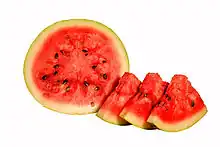Watermelon
A watermelon (Citrullus lanatus) is Latin for a plant which was first domesticated in Africa. It is a cultivated edible fruit. It is grown worldwide, there are more than 1000 varieties.
| Watermelon | |
|---|---|
 | |
| Watermelon | |
 | |
| Watermelon cross section | |
| Scientific classification | |
| Kingdom: | Plantae |
| Clade: | Tracheophytes |
| Clade: | Angiosperms |
| Clade: | Eudicots |
| Clade: | Rosids |
| Order: | Cucurbitales |
| Family: | Cucurbitaceae |
| Genus: | Citrullus |
| Species: | C. lanatus |
| Binomial name | |
| Citrullus lanatus | |
| Synonyms[1] | |
|
List
| |
About 6% of a watermelon is sugar, which gives it a sweet taste. There are many different types of watermelon. Some have a green rind on the outside and a red-pink flesh on the inside, with brown seeds. Some can have yellow flesh, and some can be seedless. The green rind on the outside is not usually eaten, though it can be used as a vegetable. It can also be stewed or pickled. Most watermelons are oblong or spherical. In Japan, watermelons are grown in different shapes, such as hearts and squares. Watermelon
Health
Watermelons are a great source of vitamin A, vitamin C, vitamin B1 and vitamin B6. They also contain potassium, magnesium, carotenoid antioxidant, and lycopene. The watermelon flesh is healthy to eat.[2]
References
- "Citrullus lanatus (Thunb.) Matsum. & Nakai". World Flora Online. The World Flora Online Consortium. 2022. Retrieved 25 May 2022.
- "Top 9 Health Benefits of Eating Watermelon". 8 November 2021.